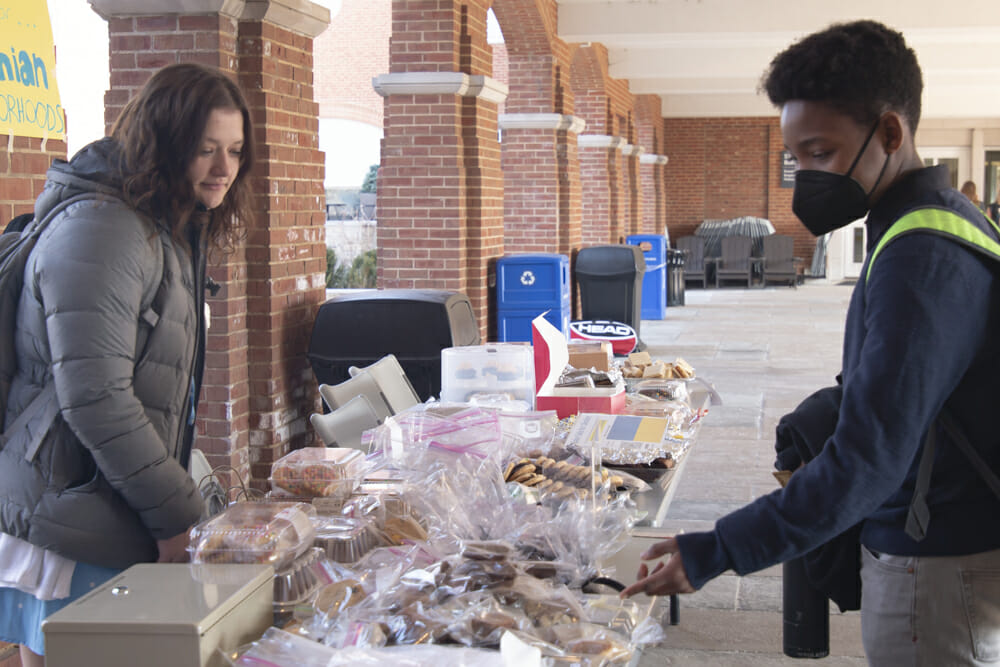At the conclusion of Tuesday’s Upper School assembly, during a presentation about the escalating Ukrainian refugee crisis, I provided a link to a brief survey for students and faculty to share their personal connections to Ukraine and its neighboring countries. Despite a technical issue that limited audience participation, the survey nevertheless captured hundreds of familial, ancestral, and social relationships to Ukraine, Poland, Russia, Slovakia, Hungary, Romania, Belarus, and Moldova in our Upper School alone. “I am large,” Walt Whitman famously declares in Song of Myself. “I contain multitudes.”
At another Upper School assembly two days later, we were privileged to host Charlie Allen ’73 to understand more thoroughly the invasion of Ukraine and its repercussions. Charlie first studied Russian at Saint Louis Country Day School under Nadia Danett (“She taught me right there,” he remarked as we walked through May Hall, pointing to what is now the Upper School language lab), and he went on to earn degrees in Russian language and literature, Soviet studies, and Slavic studies from Dartmouth, Harvard, and the Sorbonne, respectively. Charlie has spent most of his career overseas and is particularly knowledgeable about the social, political, religious, and cultural histories of Eastern Europe and the former Soviet Union.
“Ukraine is not Russia,” Charlie began, noting the many occasions since its original subjugation under Catherine the Great that Ukraine has sought independence from its expansive neighbor. Citing the work of James Wertsch at Washington University, Charlie described the Ukrainian and Russian “historical narratives” as similar to the extent that both begrudge incursions by foreign aggressors, but divergent to the extent that Ukraine resists its enemies with the goal of establishing regional independence, whereas Russia resists its enemies with the ambition of establishing global greatness. Charlie noted Vladimir Putin’s fascination with the Russian philosopher Ivan Ilyin, who dreamed of “an unflinching leader who will aggressively attack foreign enemies and advance the interests of a proud Russia.” The Russian historical narrative by way of Ilyin and Putin conceives of NATO and the West as “foreign enemies,” imagines “a proud Russia” as inclusive of Ukraine, and therefore disregards the legitimacy of both the Ukrainian national narrative and any criticism of Russia’s present military action.
The scholarship of Henry Louis Gates Jr. and Andrew S. Curran laments the historical phenomenon of “scientific racism” according to which, beginning in the 18th century, “naturalists increasingly subdivided the human species into several so-called races by things like skin color, hair texture, skull shape and, most perniciously, supposedly transcendent essences.” Their article in yesterday’s New York Times notes the extent to which advancements in technology, especially commercial DNA testing, are “changing the way we think about human origins.” Gates, an eminent public intellectual who identifies as Black and who directs the Hutchins Center for African and African American Research at Harvard University, acknowledges the surprise he felt upon discovering his English and Irish ancestry. “Who could have guessed that a Black scholar who has spent so much of his professional life searching for his long-veiled African ancestry would finally find it — only to discover that he’s half a white man.” If it was 18th-century “science” that convinced us that human beings are categorically different from one another, Gates and Curran write, perhaps it will be 21st-century science that convinces us “just how meaningless those categories are — and how connected we’ve been all along.”
Without the “supposedly transcendent essence” of Russian-ness imagined by Ilyin and Putin – without their own ethnoreligious and imperial version of scientific racism – Russia’s invasion of Ukraine has no defense whatsoever. The ascendancy of a more scientific humanism must supplant the long legacies of scientific racism and its retrograde corollaries, whether in response to tremendous acts of nationalistic aggression like the one to which we are all now bearing witness, or to everyday acts of racism, ethnocentrism, homophobia, xenophobia, and related phenomena around the world. We are not categorically different from one another as human beings. We are large. We contain multitudes.
“What one needs to do at every moment of one’s life,” wrote the Ukrainian philosopher Nikolai Berdyaev at the end of his own life, “is to put an end to the old world and to begin a new world.” Always reason, always compassion, always courage. I wish you and your families a wonderful weekend together. My best wishes to you and your loved ones in this early new beginning of spring.
Jay Rainey
Head of School
This week’s addition to the “Refrains for Rams” playlist: Seeds by Yoke Lore (Apple Music / Spotify)
